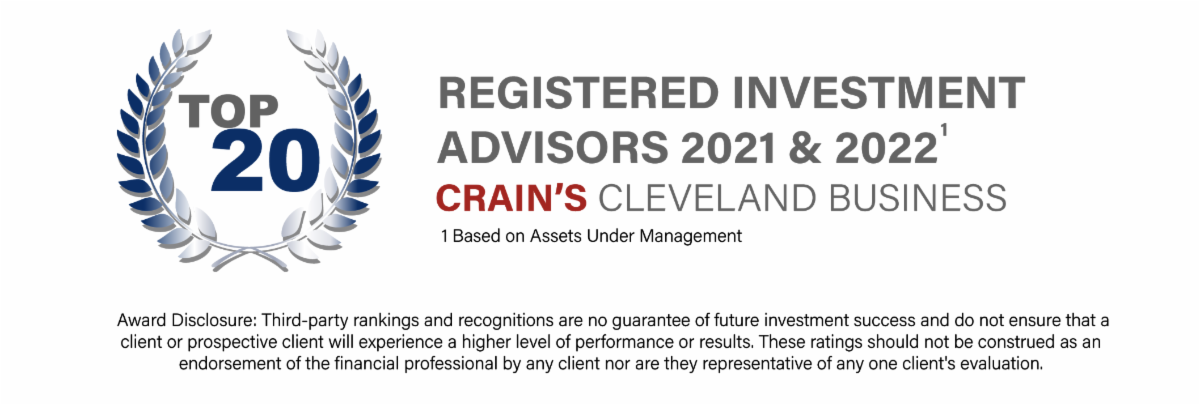Posted By Lineweaver Financial Group
June 29, 2022
Category: Finance, Blog, Newsletter, New Year, Educational
Financial markets are off to a challenging start this year as high inflation and rising interest rates have impacted both the stock and bond market. But at a time when news headlines and investors appear focused on the negative outcomes, we’re here to discuss some proactive moves investors can make to combat market volatility.
This year’s decline in both stocks and bonds has been painful for passive investors. Year-to-date a traditional portfolio of 60% stocks and 40% bonds has declined more than 10%, which is on pace for its worst year since 2008.
However, with the right professional financial advice, investors can be making proactive portfolio adjustments to better suit the current market environment.
Some of these adjustments might include implementing positions that benefit from higher inflation, shifting equity exposure from previous leadership to areas of the market that are emerging as winners in this new environment, and focusing on dividend stocks and higher yielding bonds.
Within equities, for over a decade, investors have been able to rely on growth areas of the stock market for leading market returns, however, now these areas such as consumer discretionary and technology are showing early signs of a possibly dimming return outlook.
While those areas may be challenged, prospects for other areas of the market appear to be brightening. These include areas such as the natural resource/energy sector
Posted By Lineweaver Financial Group
June 17, 2022
Category: Finance, Blog, Newsletter, New Year, Educational
We are humbled and excited to share that we have been ranked in the top 20 of Crain’s Cleveland’s annual list of Registered Investment Advisors based on assets under management for the second year in a row.
While this is a great milestone and accomplishment for us, we know that there are really two reasons for it: a great staff, and client trust. Our staff work hard and go the extra mile for clients, and in turn clients trust us, and use us as a valued sounding board, as well as introduce us to their family and friends. To us, there is no higher recognition.
We also believe in personal service. We know how frustrated people are with phone trees and digital assistants where they have to answer questions, and are often transferred and re-routed. We live in a fast-paced world that requires cutting edge technology and the latest market analysis to make smart, informed decisions for all our clients. But, when it comes to service, we believe in a personal touch. You’ll always speak with a person, and we pride ourselves on getting you answers to your questions in 24 hours or less.
For nearly 30 years, our team of qualified, experienced, and credentialed professionals has provided our private and corporate clients with a plethora of options for their financial needs. Our success lies with our continued commitment to providing clients with sound advice, world class customer service, and accessible resources for their current needs and future aspirations.
We bel
Posted By Lineweaver Financial Group
June 02, 2022
Category: Blog, Economy, Commentary, Finance, Portfolio
Student loans are a great investment when continuing your education so it’s important to know the different kinds that are available and the strategies for dealing with them.
According to data from Lendingtree.com, more than 2/3rds of graduates – from both public and private institutions – have student loans and it’s something that affects many Americans.
For parents and grandparents of current college students, there are a few different kinds of student loans to understand. These fall into four categories: Subsidized, Unsubsidized, PLUS loans, and private loans.
When it comes to Federal loans, there are essentially three kinds. Subsidized are only applicable to undergraduates with demonstrated financial need. Unsubsidized loans are not tied to financial need, and are available to all undergraduate, graduate, and professional students. PLUS loans are available for graduate and professional students, as well as the parents of dependent undergrads. Subsidized and unsubsidized federal student loans don’t require a credit check, and you are able to secure them simply by signing a form indicating that you will pay them back. However, PLUS loans and private loans will require a credit check.
Private loans come from banks and other financial institutions who lend directly to students and their families. These are similar to any private loans, in that they’ll require a credit check, and the lender will want to see proof that you are
Posted By Lineweaver Financial Group
May 12, 2022
Category: Blog, Commentary, Finance, Dividends, Series
As we all deal with continued market volatility, inflation, and other economic headwinds, qualified dividends can be a great strategy for your portfolio. This is the second in a two-part series discussing possible dividend strategies. So, what are the main benefits we can expect from qualified dividends?
There are three things you should consider when adding qualified dividends to your portfolio. First, they can be a major contributor to total return. Second, you need to carefully vet the quality. And third, they can have very beneficial tax treatment. There are many types of dividend-paying stocks, but there are two that are particularly timely: bank preferred shares, and oil and gas exploration and production.
Last week, we discussed Oil and Gas E & P, and we know from the number of calls we received, that many people were interested. This week, we’ll talk more about bank preferreds.
These are particularly timely as a strategy because many banks are flush with cash as a result of the stringent regulations after the financial crisis of 2008. These are currently attractively priced, and let you lock in your yield for at least 5 years – but possibly much longer. That doesn’t mean your money is tied up though because they can be sold any time.
And preferred shares typically decline in price as interest rates rise, so substantial discounts are already available. When you purchase at a discount to par, your total return
Posted By Lineweaver Financial Group
April 28, 2022
Category: Blog, Economy, Commentary, Dividends, Portfolio
As we all deal with continued market volatility, inflation, and other economic headwinds, qualified dividends can be a great strategy for your portfolio. This is the first in a two-part series discussing possible dividend strategies. So, what are the main benefits we can expect from qualified dividends?
There are three things you should consider when adding qualified dividends to your portfolio. First, they can be a major contributor to total return. Second, you need to carefully vet the quality. And third, they can have very beneficial tax treatment. There are many types of dividend-paying stocks, but there are two that are particularly timely: bank preferred shares, and oil and gas exploration and production.
The first thing to understand about oil and gas E&P is that these are really just common shares of U.S. or Canadian gas and energy production companies.
Many of these companies paid down debt substantially in the last 5 years, have reduced well costs, and have a break-even price with West Texas Intermediate, or WTI at $30-$35 a barrel. And as all of us know who have bought gas recently, it’s significantly more than that!
These are generating significant free cash flow right now, which won’t surprise most of us who have been to the gas pump recently. But many companies have committed to use this excess cash flow to reward shareholders by raising base dividends, and some are even adding a variable dividend based
Posted By Lineweaver Financial Group
April 13, 2022
Category: Blog, Newsletter, Economy, Commentary, Finance, Portfolio
U.S. stock markets have been declining since the beginning of January and fell further into correction territory after the Russian invasion, though markets recovered from their lowest levels since then. During this correction, the S&P 500 declined nearly 15% from peak to trough, while the Russell 2000 Index and the Nasdaq Composite both briefly entered bear market territory (down 20% or more).
While we recognize that the current geopolitical landscape in Eastern Europe remains highly uncertain, we believe history may be a reasonable guide for what to expect from financial markets.
If history is any guide – and by history, we mean Iraq’s invasion of Kuwait and N. Korea’s invasion of S. Korea, since these are the most recent and similar events - financial markets tend to peak before the actual conflict date, as tensions rise, and the overall S&P 500 decline has historically been 14-21%. Therefore, equity markets may have more downside in the short term, but we may be closer to the end of this correction than the beginning, based on current geopolitical circumstances. However, we do expect financial markets to continue to experience heightened volatility in the short term.
In our experience, sometimes individual investors tend to make emotional and often irrational decisions during periods of financial market volatility. Your emotions in situations like these can be your greatest enemy when it comes to making the right financial
Posted By Lineweaver Financial Group
April 13, 2022
Category: Blog, Newsletter, Economy, Commentary, Finance, Portfolio
People can make a variety of lifestyle changes to help manage their anxiety. Eating a diet high in vegetables, fruit, legumes, whole grains, and lean protein can be helpful.
Anxiety is a widespread condition, affecting millions of people globally. Symptoms vary, and some people only experience them now and then. However, someone who experiences symptoms for 6 months or longer may have a generalized anxiety disorder (GAD).
Doctors often treat GAD with a combination of treatments, including talking therapies, such as cognitive behavioral therapy (CBT), alongside medications. Sometimes, these conventional treatments do not work long-term. However, some research suggests that proper nutrition can help improve symptoms.
Nine foods to eat to help reduce anxiety:
1. Brazil nuts
2. Fatty fish
3. Eggs
4. Pumpkin seeds
5. Dark chocolate
6. Tumeric
7. Chamomile
8. Yogurt
9. Green tea
Eating a healthful diet should provide all the nutrients needed for healthy brain function.
A healthful diet that contains antioxidant and anti-inflammatory compounds, as well as vitamins and minerals might help reduce inflammation and oxidative stress.
Reducing foods that are high in added sugar, salt, and fats - especially trans fats - may help reduce inflammation. Reduce alcohol, sugar, and coffee as these may increase episodes of anxiety and the associated symptoms.
One report states that participating in enjoyable physical activity may also have a positive effect on mental
Posted By Lineweaver Financial Group
April 13, 2022
Category: Blog, Newsletter, Economy, Commentary, Finance, Portfolio
Most of us spend our whole lives building wealth, and we want our families and the next generation to benefit. But without planning, it doesn’t work out that way. For example, one study found that most wealth is lost in America within three generations. The biggest concern we hear from clients is, “how will our children (or grandchildren) be spending their inheritance?” It’s not uncommon for an entire inheritance to be spent within a couple of months – which is fast when you consider that these inheritances are often substantial. Sometimes, it’s simply due to reckless spending. But more often, we see it caused by one of three issues: emotion-based decision making, pressure from family and friends, and/or a lack of professional assistance. Let’s look at each of these a little more deeply.
1. Emotion-Based Decision Making
While we can understand grief and emotion in the wake of losing a parent or grandparent, we never make good decisions when we’re making decisions based on our emotions. And sometimes it is the impulse purchases that are the issue – like buying a car, or house, or taking a vacation. But, more often it involves making major life changes, like quitting a job, or sinking an entire inheritance into a new business venture that eventually fails. In the case of starting a new business, people often have a passion for a specific type of business, but don’t have the education or experien
Posted By Lineweaver Financial Group
April 13, 2022
Category: Blog, Newsletter, Economy, Commentary, Finance, Portfolio
by Jim Lineweaver, CFP®, AIF® President and Founder
Most of us have already filed our taxes for 2021, but that doesn’t mean we’re happy about it! As we saw our tax bills this year, many of us may have wished we would have planned differently last year. While there aren’t many strategies that still apply for 2021, we want to remind everyone that planning for next year’s taxes starts now.
In 2021, many people started their own business or added consulting to their list of services. If you find yourself in this situation, there are a wide variety of tax deductions you can take advantage of, such as writing off a lease or mileage on your car, your home, and computer equipment you might have previously owned. For your new venture, there are also a wide variety of retirement plans available.
Another common question we get each year is about gifting – whether it’s to a friend, family member, or a favorite charity. I always recommend that clients consider gifting appreciated securities rather than their hard-earned cash. Gifting an appreciated security means getting a write-off for its current full value. So, even if you only paid $10,000 for a security, and it’s now valued at $20,000, you can write off the whole $20,000 when you donate or gift it. And you can even gift appreciated property or real estate.
This year, the IRS has also increased the “above the line” deduction that came about in 2020, to $300 a person
Posted By Lineweaver Financial Group
March 17, 2022
Category: Blog, Economy, Commentary, Finance, Portfolio
Watch Cleveland Clinic’s Associate Chairman of Philanthropy Chris McMahan and Jim Lineweaver on The Financial Quarterback! Jim and Chris discuss charitable giving strategies you can use. They also examine the Cleveland Clinic’s impact and donor engagement around the entire globe!
Financial Quarterback - Charitable Giving as a Wealth Strategy
Air date
Posted By Lineweaver Financial Group
February 17, 2022
Category: Blog, Economy, Commentary, Finance, Portfolio
Most of us spend our whole lives building wealth, and we want our families and the next generation to benefit. But without planning, it doesn’t work out that way. For example, one study found that most wealth is lost in America within three generations. The biggest concern we hear from clients is, “how will they be spending their inheritance?” It’s not uncommon for an entire inheritance to be spent within a couple of months – which is fast when you consider that these inheritances are often substantial. Sometimes, it’s simply due to reckless spending. But more often, we see it caused one of three issues: emotion-based decision making, pressure from family and friends, and/or a lack of professional assistance. Let’s look at each of these a little more deeply.
1. Emotion-Based Decision Making
While we can understand grief and emotion in the wake of losing a parent or grandparent, we never make good decisions when we’re making decisions based on our emotions. And while sometimes it is the impulse purchases that are the issue – like buying a car, or house, or taking a vacation. But, more often it involves making major life changes, like quitting a job, or sinking their entire inheritance into a new business venture that eventually fails. In the case of starting a new business, people often have a passion for a specific type of business, but don’t have the education or experience with the kind of b
Posted By Lineweaver Financial Group
February 03, 2022
Category: Blog, Economy, Commentary, Finance, Portfolio
It’s getting to be that time of year again when we all have to think about tax filing for last year. We want to remind everyone of some strategies you may be able to take advantage of on your 2021 tax return.
It’s not too late to max out things like IRAs, Roth IRAs, SEPs, and Health Savings Accounts for last year. You can still make the additional contributions before the filing date this year, which is Monday, April 18th. Maxing out your contributions is always a good idea because it can increase your savings and investments, while decreasing your annual tax bill.
Tax-loss harvesting is another strategy that can help investors minimize any taxes they may owe on capital gains or their regular income. As a strategy, it involves selling an investment that has lost value, replacing it with a reasonably similar investment, and then using the investment sold at a loss to offset any realized gains. Keep in mind that tax-loss harvesting only applies to taxable investment accounts; retirement accounts like IRAs and 401(k) accounts grow tax-deferred so they are not subject to capital gains taxes.
Another common question we get each year is about gifting – whether it’s to a friend, family member, or a favorite charity. I always recommend that clients consider gifting appreciated securities rather than their hard-earned cash. Gifting an appreciated security means getting a write-off for its current f
Posted By Lineweaver Financial Group
January 18, 2022
Category: Blog, Newsletter, Medical News Today, Educational
Every person experiences cravings differently, but they are typically transient and often for processed foods that are high in sugar, salt, and unhealthful fats.
CAUSES
The brain regions responsible for memory, pleasure, and reward play a role in food cravings. An imbalance of hormones, such as leptin and serotonin, could also lead to food cravings.
Cravings also involve the appetite centers of the brain, even though they tend to be separate from hunger.
There are two types of food cravings: selective and nonselective.
Selective cravings are cravings for specific foods, such as a person’s favorite chocolate bar, a particular burger from their favorite restaurant, or a bag of potato chips of a certain flavor.
Nonselective hunger is the desire to eat anything. It may be the result of real hunger and hunger pangs, but it can also be a sign of thirst. Drinking water may help with intense nonselective cravings.
HOW TO REDUCE CRAVINGS
Reduce stress levels
Drink plenty of water
Get enough sleep
Eat enough protein
Chew gum
Most people experience food cravings from time to time. These cravings can cause them to snack on unhealthful foods, which can lead to weight gain.
Various methods, such as reducing stress and staying hydrated, can help people minimize their cravings. Substituting healthful foods for unhealthful ones can also help.
Source: Medical News
Posted By Lineweaver Financial Group
January 18, 2022
Category: Finance, Blog, Newsletter, New Year, Educational
Every year at this time, we meet new clients who want to drastically overhaul their finances and set themselves up for wealth in the new year. I’ve put together a list of 5 resolutions that I always share, and that you can put to work for yourself as well.
First things first: The base of any good financial plan is insurance, because it helps you control risk. You can have the best financial plan in the world, but if something happens to you or your family, you need to be protected to keep your plan on solid footing. You’ll want to take the time to make sure all your insurance is in proper order. This includes life insurance, disability insurance, 2Fand even property and casualty. Because we specialize in working with retirees, long term care is especially important to our clients. According to the U.S. Department of Health and Human Services, 70% of people aged 65 or older are likely to need long-term care at some point. Finally, you may want to consider an umbrella policy, especially if you have rental or vacation homes.
Secondly, your financial goals, both long and short term, should be driven by your personal goals – whether that’s providing for children and grandchildren, sending them to college, passing the family business to the next generation, or preparing for your own retirement and the traveling you want to do, you should think about those goals and how they compare to where you are now. I sit down with my clients and, i
Posted By Lineweaver Financial Group
January 18, 2022
Category: Blog, Newsletter, Economy, Commentary, Finance, Portfolio
Commentary by Jerry Herman, CFA®
In 2021 the world returned to some level of normalcy and featured a recovering and generally strong economy. However, we continued to face ongoing challenges from the pandemic, supply chain disruptions, the highest inflation levels in decades, and generally sustained low interest rates. Overall investors benefitted from this combination – with equities strong and fixed-income weak. Fueled by massive fiscal and monetary stimulus, a vaccine rollout and pent-up consumer demand, U.S. GDP grew an estimated 5.5% in 2021, the fastest pace in more than a quarter century.
Household finances emerged from the crisis and spending on big-ticket items surged. Unemployment declined from 6.7% at the beginning of the year to around 4% at year-end with increasing signs of labor market tightness. The year featured high prices and inflation surprises. Through November, the consumer price index (CPI) topped 5% for seven straight months, with the November reading coming in at 6.8%, the highest in 40 years.
Supported by a strong economic recovery and very accommodative monetary policy, the S&P 500 reached 70 record highs during the year, the most since 1996. The S&P 500 returned 26.89% in 2021, which followed gains of 18.4% in 2020, and 31.5% in 2019 - only the third time since 1926 that returns were greater than 18% for three straight years. The Dow was up 18.73%, and the Nasdaq was up 21.4%.
Posted By Lineweaver Financial Group
January 18, 2022
Category: Blog, Newsletter, Economy, Commentary, Finance, Portfolio
Many people think that estate planning is only for older people – but it actually starts as early as college! When most students go to college, they are adults. This means they can take out loans, manage their time and course load, and generally make decisions for themselves. While parents’ lack of access to grades and other information can be frustrating, if children have not considered their estate planning, the surprises can be far more serious. Besides being the provider of food, housing, and often transportation, parents are the “natural guardians” over minor children. This means they are their child’s legal representative and can act on behalf of their children in financial and personal matters.
For example, if a minor child falls off a trampoline and breaks his arm, his parents can legally make medical decisions on behalf of the child. The same goes for financial matters. Parents can open financial accounts for their minor children, apply for life insurance, and so on. When those children turn 18, their parents’ power over them disappears. If an adult child is incapacitated in a car accident, his parent cannot by default make health care decisions for the child. The same goes for financial matters. So, what do parents and college kids need to consider to protect themselves in these scenarios?
There are 2 parts to this – first, a Health Care Power of Attorney, can give his parents authority over a child’s health d
Posted By Lineweaver Financial Group
December 10, 2021
Category: Blog, Holiday, End Of The Year, Commentary, Finance, Economy
As wonderful as they can be, the holidays are usually stressful. Between juggling your usual responsibilities, attending holiday parties, spending time with family and friends, and braving the crowds to shop or go out, there is never enough time or money. Here are a few tips we think are worth sharing to help ease your stress and get the most out of your time and money this holiday season.
1. Make a budget: Our recommendation for most families is that they don’t spend more than 1% of their annual household income on the holidays. So, if you have a combined income of $200,000, you would have $2,000 to spend.
2. Make a list: By making a gift list and thinking about how much to spend on each person, you’ll have a better idea of what your budget should be. Although it’s easy to overlook the small costs, those are the ones that can add up quickly. Remember that this budget should also include things like cards, postage, décor, wrapping paper and bows, food, parties, and even travel.
3. Create a spending cap for each person: This goes along with #2 - there are so many groups to buy for – family, friends, coworkers, even the mailman. We recommend creating a cap for each person – a total budget tends to quickly get out of hand when you don’t add it up until your shopping is
Posted By Lineweaver Financial Group
October 07, 2021
Category: Blog, Education, Commentary, Finance, Planning, College
Many people think that estate planning is only for older people – but it actually starts as early as college!
When most students go to college, they are adults. This means they can take out loans, manage their time and course load, and generally make decisions for themselves. It also means that their parents are often surprised by how little control they have over their children's lives.
While parents' lack of access to grades and other information can be frustrating, if children have not considered their estate planning, the surprises can be far more serious.
Besides being the provider of food, housing, and often transportation, parents are the "natural guardians" over minor children. This means they are their child's legal representative and can act on behalf of their children in financial and personal matters.
For example, if a minor child falls off a trampoline and breaks their arm, their parents can legally make medical decisions on behalf of the child. The same goes for financial matters. Parents can open financial accounts for their minor children, apply for life insurance, and so on.
When those children turn 18, their parents' power over them stops. If an adult child is incapacitated in a car accident, their parents cannot, by default, make health care decisions for the child. The same goes for financial matters. So, what do parents and college kids need to consider to protect themselves in these s
Posted By Lineweaver Financial Group
October 05, 2021
Category: Blog, Newsletter, Economy, Commentary, Finance, Portfolio
The Biden administration is proposing about $4 trillion of new federal spending over 10 years as part of their new infrastructure legis-lation. To partially fund this new initiative, the new tax proposal includes higher taxes on individuals and corporations. These changes could potentially include higher individual and corporate tax rates, higher taxes on capital gains and new individual and corporate tax credits. Let’s take a look at some of these proposed changes:
• The current top individual tax rate is 37 percent. The Biden proposal will raise the top rate to 39.6 percent. This would apply to taxable income over $452,700 for individuals and $509,300 for heads of households and joint filers.
• Tax long-term capital gains and qualified dividends as ordinary income for taxpayers with taxable income above $1 million. That would result in a top marginal rate of 43.4 percent when including the top marginal rate of 39.6 percent and the 3.8 per-cent Net Investment Income Tax. Current law has long-term gains and qualified dividends taxed at 20 percent for those same individuals, plus the 3.8 percent Net Investment Income Tax.
• Tax unrealized gains at death for unrealized gains above $1 million ($2 million for joint filers, plus current law capitals exclu-sion of $250,000/$500,000 for primary residences).
• Apply the Net Investment Income Tax to active pass-through business inc
Posted By Lineweaver Financial Group
October 05, 2021
Category: Blog, Newsletter, Economy, Commentary, Finance, Portfolio
Carbohydrates often get a bad rap due to the association of their excessive consumption with weight gain, obesity, met-abolic syndrome, and diabetes.
This phenomenon, which some researchers call “carbotoxicity” promotes the idea that the ex-cessive consumption of all types of carbohydrates favors the development of chronic diseases. For this reason, many low car-bohydrate diets have become popular among people interest-ed in losing weight or managing blood sugar levels. They are even in favor among seasoned athletes.
However, several other studies have demonstrated that the quality of carbohydrates that people consume is as important as the quantity. This finding suggests that rather than all carbs being “created equal,” some options are better than others for health.
Carbohydrates are an essential macronutrient, providing the body with energy and dietary fiber to support good health. Excessive consumption of car-bohydrates is associated with weight gain and an increased risk of the development of chronic diseases, such as heart disease and diabetes.
Despite their bad rap, however, carbohydrates offer many health benefits when a person frequently consumes sources of complex carbs and dietary fiber in favor of refined carbs and sugar-sweetened beverages.
Before making changes to their diet, people should speak with a doctor or registered dietitian to determine their specific carbohydrate needs to optimize their health






















 Virteom
Virteom